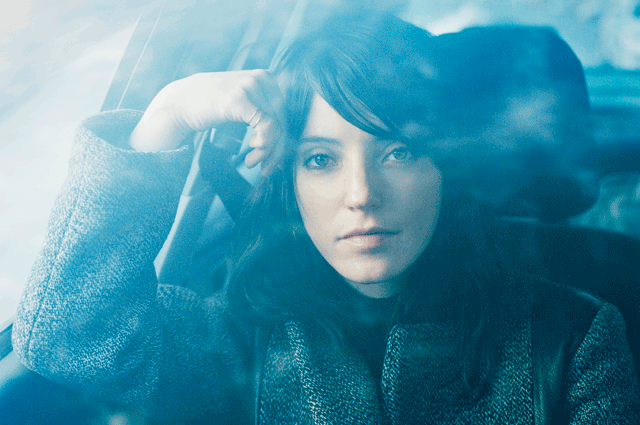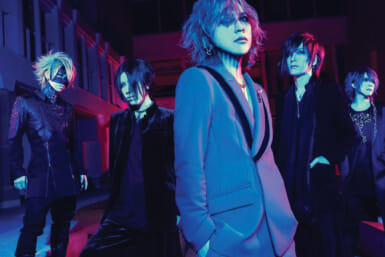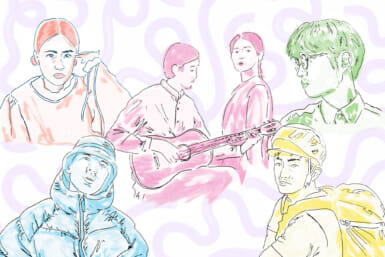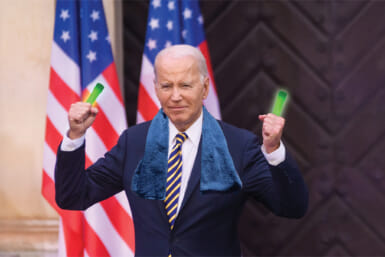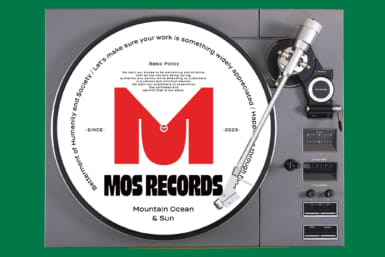Sharon Van Etten is defiantly forlorn and boldly vulnerable whenever she sings. On her fourth album, dubbed “Are We There,” the New Jersey–born songstress holds key lyrical phrases and notes long past conventional measures, until they sound like wails and winces.
By Kyle Mullin
But in conversation Van Etten seems far from downtrodden or morose. In fact she giggles, jokes, and recounts the improvised cusses in one of her most beloved songs with rueful enthusiasm. During a recent interview with Tokyo Weekender (ahead of her performance tonight at Billboard Live) the songwriter discussed the joy and pain in her music, her opportunity to record in one of the world’s most legendary studios, her love of dirty jokes, and more.
What was it like to record parts of “Are We There” at the famed Electric Lady Studio?
I recorded the piano ballads there just because the piano at our main studio was an upright, and I couldn’t isolate the sound. So I played the Wurlitzer piano at Electric Lady for songs like “I Love You But I’m Lost,” and a few others. (Pauses) What was that other song? I’m forgetting now [laughs]. “Tarifa”! That was it. We did those at Electric Lady, but almost everything else was done at [Grammy Winning producer] Stewart Lerman’s studio, called Hobo’s Sound, in New Jersey.
How did each location inspire you?
Well, it was an obvious honor to record at Electric Lady because of the history there—all the legends that have recorded there. Like Patti Smith: I mean c’mon. The space definitely has a vibe. But I really just went in there to use the piano, which was the piano that was used for (Smith’s 1975 debut) “Horses.” She didn’t play that piano, of course, but I’d like to think she leaned up against it or something, that her energy was absorbed into the wood.
But I think the real magic happened at Stewart’s studio. We recorded there full time there for a few months, starting in August and finished by Halloween, working six-day weeks. But Stewart really turned it into a haven, and everyone felt so welcome there. I think that’s part of why the album is so special.
How did he turn it into a haven?
He’s really welcoming of ideas, and he thought all of our backgrounds were interesting and let us be ourselves. He was helpful by being laid back and really believing in my ideas, and helping me see them through. It’s easy to feel vulnerable in a studio when your ideas aren’t fully realized. But even though he’s had so much success, he’s not on an ego trip. He just wants you to find yourself.
What were some of the differences between having Stewart as a producer for “Are We There” and enlisting Aaron Dessner from The National to produce your last album, 2012’s Tramp?
Well, Aaron’s studio was in his garage in his back yard. I felt at home there too—don’t get me wrong—but it was mostly just the two of us doing everything together. And I was still lacking the confidence to speak my mind. He still really believed in my intuition in the studio, but I came in a lot more prepared for “Are We There.” I had a notebook with ideas that were organized, and I had a band, finally, that I could bring in the studio that had been living with these songs since I had written them on our last tour. So it felt more like my zone, rather than me sharing somebody else’s.
One of the most compelling songs from the new record is “Our Love.” It has a much lusher production than the rest of the album. What inspired that choice?
That was actually a really tough one, because when I first wrote it, it was a sad, mellow, dark pop song. I got nervous when drums were added, and worried that it was sounding poppy and fluffy. And everyone was laughing, saying “There’s no way this song could become that.” I got encouraged because everyone really supported it, saying it was just another side of myself that I shouldn’t be afraid to show. And once I got past that, I was able to record it and let go, and embrace it for its own beauty. But it took me a minute.
What would be wrong with it sounding “poppy?”
It’s just me overthinking things. There are lots of dark songs that are poppy, and my idea of pop is so not what the masses think is a pop song. “Our Love” is still so very dark, even for a pop song.
Aside from the production, that song stands out for me because of the lyric: “You say I am genuine/ I see your back hand again.” Were you referring to a backhanded compliment, or something more violent?
It’s meant to be ambiguous. There’s no actual violence, but it’s on the verge of something violent. Sort of like: I can see it happening, but it hasn’t happened yet.
Why is that ambiguity important to you?
I like fans to be able to connect to the song in their own way, rather than me painting a picture of what my life. That way, they can separate what I went through and apply it to themselves.
So “Our Love’s,” lyrics are autobiographical in a way?
They’re about the dichotomy of being in love with somebody where it might not be healthy. Because you don’t love someone for no reason— even if it’s unhealthy, there’s still something true there, and that’s hard to get out of sometimes. You can love someone really deeply even if you’re not supposed to be with them. So there’s a lot of ambiguity and trying to figure that out on this record, but a lot of love on there too.
Are there other specific lyrics inspired by that ambiguous love?
It inspired my choice for the album cover. It’s a photo I took of my friend Rebecca. When I left for New York, to become a musician, she was the one that drove me to the airport. I always loved how the photo turned out, and it was the first picture I gave my boyfriend. Then I didn’t see it again, because we were on and off again for the next ten years. I assumed he’d thrown it away. And when I moved in with him later he pulled it out from a shoebox under this bed when he was making room for my stuff. He had the photo, along with every postcard I’d sent him over the years all covered in dust. I had no idea that he was sentimental like that. It made me realize I didn’t know him that well, and it was as sign of where we were in our relationship.
That’s also when I realized the themes on the record are about a home life versus a life on the road. The timing of finding that photo was pretty epic and really described how I was feeling when I was recording.
Aside from “Our Love,” what were some of the other challenges you faced while recording “Are We There”?
The song “Every Time the Sun Comes Up” was tricky. I hadn’t even finished it, and my band just kept encourage me to try. It was after an eight hour day, so I took a break, had some drinks and chilled out. When I was finally feeling a bit loose, I basically freestyled the lyrics: “I washed your dishes, but I sh***** in your bathroom… We broke your glasses, but covered our asses.” I thought I wouldn’t use them, because I couldn’t imagine singing that onstage, but my band thought it was so funny that they begged me to keep it. And people ended up loving that song, even though it’s just me talking about what happened during that hour where we took a break from recording.
I was about to ask you about that line next actually. You must get some funny responses about it from fans?
I’m just more embarrassed when journalists ask: “When you sing ‘S*** in the bathroom,’ what do you mean by that exactly?” (Laughs). So I tell them: “There was just a little bathroom in the studio where we washed the dishes we used. So I washed the dishes. And then I s*** in the studio bathroom. End of story.” Those lyrics were just me goofing off. My bandmate Zeek and I just dropped a few glasses, but we cleaned them up in time before Stewart came back. It was just us being drunk and silly. I didn’t think I’d keep these lyrics, I didn’t think they were genius or anything. But I like that it helps fans see my sense of humor. I want them to see that I’m not this completely dark person.
How important is it for you to show that other side of yourself? Some people might assume you’re very brooding, based on your earlier songs.
I hope that people can see I can write these songs, that i have an outlet, and that because of my writing, I can goof off. I want them to know I’m okay, and I don’t want people to worry or pity me. Writing is my therapy. It takes time to be able to really move on from the things I write about, but writing helps me move on in a healthier way.
In a 2012 interview you said: “My mom used to ask me when I was gonna write a happy song. I still tell her that it’s when I start to write really happy-sounding songs that everyone needs to start worrying.” So what does you mom think of “Are We There”?
She’s my mom, so she’s always going to be worried about me. She’s also a teacher, so she was like: “You sang s*** in the bathroom? Come on.” Some of the more serious stuff is hard for her to hear. But she’s knows I’m in a good place, and she’s proud of me.
But, for a while, you weren’t in a good place?
When I first came to New York ten years ago, to pursue music, I fell in a with a supportive group of people. But outside of that, there are people that can be competitive and weird, that snubbed me or acted like I didn’t belong. I was so naive that I didn’t care though, I was just so excited to be there. I just kept playing shows every night, opening for anyone. I played at this coke bar at 11 night, it’d just be ten people hanging out, wasted, playing pool, and a girl playing acoustic guitar in the corner. And I loved it. But it was hard: you get your ass kicked a little bit. And that’s important, so that you’ll remember why you’re doing it.
What do you mean by that?
It felt really good to play, and I believed in my songs. Even when everyone’s talking, usually there’s one person I’d connect with. So even if there’s only one person listening, it’s worth it. And i met a lot of really amazing people that way. You find your center, the more you do anything. The more you do anything, the more it helps you find where you belong. But it took me a while.
Sharon Van Etten will be playing live tonight at Billboard Tokyo. Please visit their site for more details.

